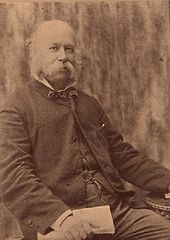Ruggero Bonghi
Ruggero Bonghi (born March 21, 1826 in Naples , † October 22, 1895 in Torre del Greco ), in a different spelling also Ruggiero Bonghi , was an Italian classical philologist , university professor , politician , writer and journalist .
Life
During his childhood and youth, Ruggero Bonghi enjoyed an excellent upbringing and achieved a high level of education. He became politically active at an early age. In 1847/48 he was an active participant in the reform and revolutionary efforts in Italy. After the failure of the revolts of 1848, he fled his hometown due to political persecution by the Bourbon regime. He found refuge in the Grand Duchy of Tuscany for a short time , until he had to flee again there because of his publications critical of the Bourbons. Bonghi came to Turin , where he summarized the results of his previous studies and worked as a translator of the works of Plato and Aristotle .
In 1858 he refused an appointment as professor of ancient Greek at the University of Pavia because the city was under Austrian rule. A year later, after the liberation of Lombardy , he accepted it from the new Italian government.
In 1860 he was elected as a member of the parliament of the young Italian state, to which he belonged until 1895 and in which he quickly achieved a certain fame because of his sarcastic speeches and polemical writings. The years 1862 to 1865 saw him again in Turin, where he founded the newspaper La Stampa . In 1865 he took over the chair of Latin literature at the University of Florence , in 1866 he went to Milan , where he was editor of the newspaper La Perseveranza until 1874 and worked with numerous other magazines. In 1867 he was appointed Professor of Ancient History by the University of Milan, and from 1871 he held the same position in Rome .
From 1873 to 1876 he was Minister of Education. During this time he reformed the Italian education system and the Accademia della Crusca , curtailed the privileges of the University of Naples, initiated the establishment of the Italian national library Vittorio Emanuele II and prevented the establishment of a Catholic university on the soil of the capital. He also founded the Direzione generale degli scavi e dei Musei ("General Office for Archaeological Excavations and Museums") and initiated the Parco Regionale dell'Appia Antica , the archaeological park along the Via Appia . He founded two orphanages for orphaned teachers' children, the Collegio Convitto for boys in Assisi and the Istituto Regina Margherita for girls in Anagni .
Since 1876, after the fall of the government to which he had belonged, he worked as an opposition politician with his usual activity and passion. As a bitter critic of the government and the Italian king, he is said to have been denied access to the royal court from 1893.
Ruggero Bonghi was a member of numerous academies and cultural institutes. In 1895 he died not far from his native city in Torre del Greco. He left numerous writings. For his services, monuments were erected in Lucera in 1890 and in Naples in 1900.
Fonts (selection)
- Translations of the metaphysics of Aristotle (5 volumes) and the dialogues of Plato (13 volumes).
- Camillo Benso di Cavour. 1860.
- La vita ei tempi di Valentino Pisani. 1867.
- I partiti politici nel Parlamento italiano. 1868.
- Storia della finanza italiana. 1868
- L'alleanza prussiana e l'acquisto di Venezia. 1870.
- Pio IX e il papa futuro. 1877.
- Leone XIII e l'Italia. 1878.
- La storia antica in Oriente e in Grecia. 1879.
- Ritratti contemporanei: Cavour - Bismarck - Thiers. 1879.
- Disraeli e Gladstone. 1881.
- Storia di Roma. 1885.
- La questione ecclesiastica. 1887.
- La rivoluzione francese del 1798 e la rivoluzione italiana del 1859. 1889.
Posthumously
- I fatti miei ei miei pensieri - pagine del Diario. 1927.
- Opera. 14 volumes, 1934–1958.
Over 500 titles are listed in the Italian union catalog.
literature
- Pietro Scoppola: Bonghi, Ruggiero. In: Alberto M. Ghisalberti (Ed.): Dizionario Biografico degli Italiani (DBI). Volume 12: Bonfadini – Borrello. Istituto della Enciclopedia Italiana, Rome 1970.
- Luca Bellingeri, Maria Gaia Gajo Mazzoni: Ruggero Bonghi fra politica e cultura. Biblioteca nazionale centrale, Rome 1996.
- Leonardo Selvaggi: Ruggero Bonghi in cinquant'anni di storia italiana. Prospettiva, Civitavecchia 2003.
- Bonghi, Ruggero . In: Encyclopædia Britannica . 11th edition. tape 4 : Bishārīn - Calgary . London 1910, p. 204 (English, full text [ Wikisource ]).
Web links
- Entry in the Portale storico of the Camera dei Deputati
- Biography about Ruggiero Bonghi. liberliber.it (Italian)
- Publications by Ruggiero Bonghi in the Opac des Servizio Bibliotecario Nazionale (SBN)
- Standard entry in the Opac of the SBN
Remarks
- ↑ In 1881 he became a corresponding member: List of members of the Crusca
- ↑ Italian Internet Union Catalog OPAC ( Memento of the original from January 1, 2007 in the Internet Archive ) Info: The archive link was inserted automatically and has not yet been checked. Please check the original and archive link according to the instructions and then remove this notice.
| personal data | |
|---|---|
| SURNAME | Bonghi, Ruggero |
| ALTERNATIVE NAMES | Bonghi, Ruggiero |
| BRIEF DESCRIPTION | Italian politician, member of the Camera, writer and journalist |
| DATE OF BIRTH | March 21, 1826 |
| PLACE OF BIRTH | Naples |
| DATE OF DEATH | October 22, 1895 |
| Place of death | Torre del Greco |
